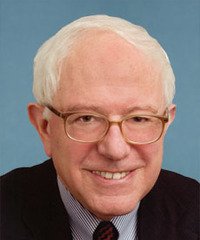
Bernie Sanders is serving his third term in the U.S. Senate after winning re-election in 2018. His previous 16 years in the House of Representatives make him the longest serving independent member of Congress in American history.
Born in 1941 in Brooklyn, Sanders attended James Madison High School, Brooklyn College and the University of Chicago. After graduating in 1964, he moved to Vermont. In 1981, he was elected (by 10 votes) to the first of four terms as mayor of Burlington. Sanders lectured at the John F. Kennedy School of Government at Harvard and at Hamilton College in upstate New York before his 1990 election as Vermont’s at-large member in Congress.
More than 70 years ago, the Supreme Court declared that a free press is not only “essential to the condition of a free society,” but also that “the widest possible dissemination of information from diverse and antagonistic sources is essential to the welfare of the public.” Unfortunately, the diversity of information sources has greatly dwindled in traditional media, as a few enormous multinational media conglomerates have consolidated ownership of more and more television networks, cable channels, publishing, radio and Internet services and sites.
Senator Sanders has been a leader in the fight to stop media consolidation and to strengthen the public interest obligations of broadcasters. In the Senate, he is working hard to make sure that we hold all media companies responsible for providing content that serves the public and offers a diverse range of opinions. For instance, he strongly opposed attempts to gut the FCC ban on corporations from owning a local newspaper, TV station and radio station in the same market. That misguided effort would have further consolidated local media markets and take away independent voices in areas already woefully short on local news and substantive journalism.
Internet Access
Access to high-speed Internet is no longer a luxury – it is crucially important to participate fully in twenty-first century education, business development, health care, and so much more. Yet, over 20 million Americans, predominantly in rural areas, still lack access to high-speed broadband services. Moreover, a significant “digital divide” still exists between Americans who have access to affordable high-speed communications networks and those who are not. With the COVID-19 pandemic forcing millions to continue working and learning from home, the time is now to ensure every American has access to affordable high-speed Internet.
The 2010 economic stimulus bill provided Vermont with a historic opportunity to significantly expand affordable broadband access. Vermont was awarded more than $172 million in federal funds – more than any other state on a per capita basis – for four separate broadband projects. While three of those projects are complete, Senator Sanders is very concerned that a federally-funded statewide wireless project is not yet operational, and he is actively working with congressional colleagues and federal agencies to address this issue.
Senator Sanders remains committed to ensuring that every Vermonter and every American has access to affordable broadband services in their homes and businesses. That is why he endorsed the Senate Democrats’ Jobs and Infrastructure Plan for American Workers, a $1 trillion plan to modernize America’s infrastructure – including $40 billion to connect all Americans to high-speed internet, with a particular focus on underserved areas.
Cable Television
Senator Sanders is a strong advocate for promoting competition in cable television, and has long fought against cable monopolies that raise rates on consumers year after year, limit local programming, and often reduce the channels available under basic cable packages. In Vermont and elsewhere, cable television is often an essential information service for consumers, and thus an affordable basic package is necessary for residents to remain informed and connected to their communities.
Net Neutrality
Senator Sanders has strongly opposed allowing internet service providers to restrict content and stifle innovation, and was disheartened when the FCC voted to undo recent progress related to net neutrality.
“Net neutrality” is the idea everyone has the same unfettered access to the same information on the internet. The FCC initially classified internet service providers as Title II “common carriers,” which prevented big corporate ISPs from negotiating “fast lane” deals with certain content providers. Under this classification, all companies would have equal access online.
Unfortunately, the FCC recently voted to reclassify internet service providers as a Title I “information service.” With this decision, the internet and its free exchange of information as we have come to know it will cease to exist. The end of net neutrality protections means the internet will be sale to the higher bidder, allowing big corporations like Comcast and Verizon to control content online. Senator Sanders believes the FCC must immediately reverse this ruling and protect freedom of speech online.